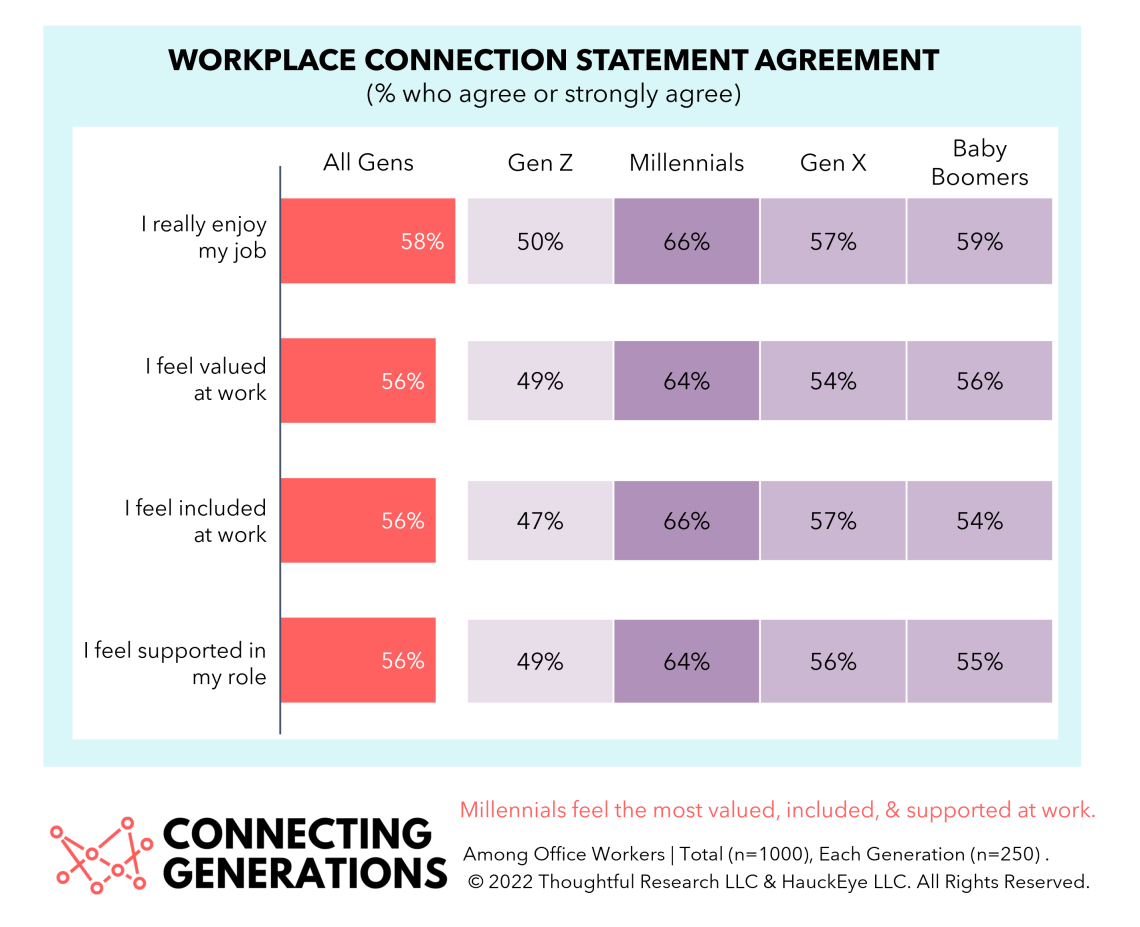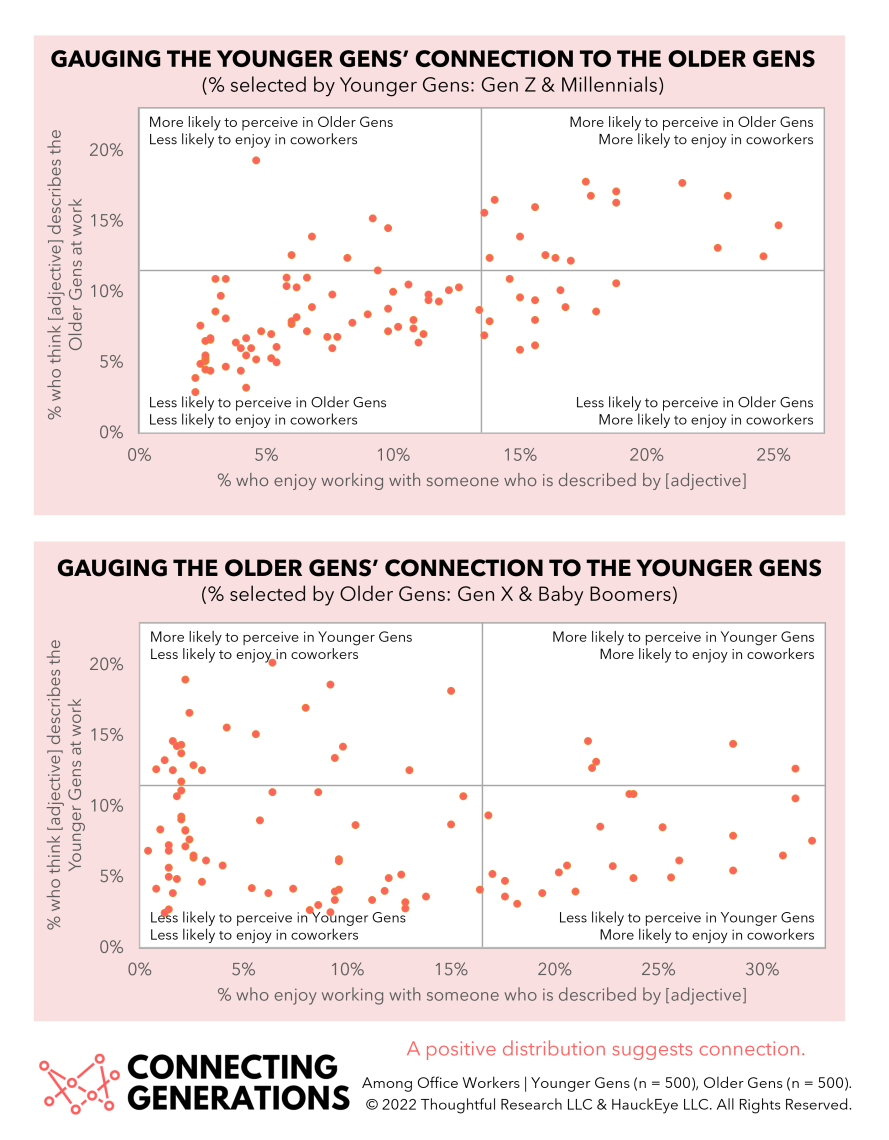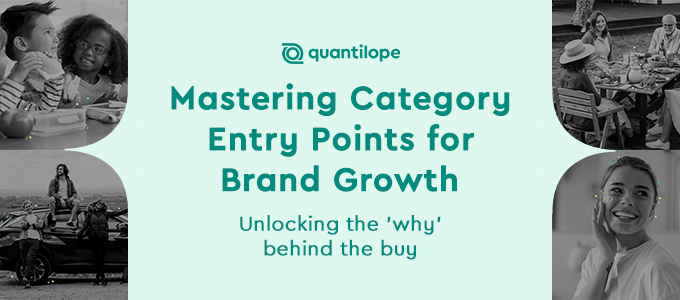Disconnection in the workplace
A record-breaking 4.5 million workers quit their job in November 2021, while a total of 43+ million workers quit their jobs across all of 2021.

Learn about the past, present, and future of the U.S. workplace through the Connecting Generations article series!
Connecting Generations is on a mission to spark connection, understanding, and empathy across generations in the workplace. This 3-part series will cover the evolution of work, disconnection in the workplace, and how we can foster positive experiences and strengthen workplace connection.
Connection is “the energy that exists between people when they feel seen, heard, and valued” - Brené Brown.
It is human nature to seek connection and positive experiences. We are hardwired to pursue interactions that make us feel understood, supported, and included. After all, it is a basic psychological need to feel secure in our relationships and like we belong. This need for connection drives decision making in all aspects of our lives, including our professional lives.
Unmet needs for connection and positive experiences are fueling The Great Resignation. According to the U.S. Bureau of Labor Statistics, a record-breaking 4.5 million workers quit their job in November 2021, while a total of 43+ million workers quit their jobs across all of 2021. A study found that the top forces driving workers to quit are feeling underappreciated/undervalued, direct supervisors that the employees have limited trust in and/or respect for, not being able to express oneself/show up authentically, and “bad” colleagues.
Additionally, many workers are stressed and facing burnout.
Our research found that about half of U.S. office workers find their jobs stressful (53%) and feel overworked (47%). Plus, 52% of workers said they experienced burnout during 2021, and 2 in 3 believe that burnout has worsened during the pandemic. The World Health Organization describes the three dimensions of burnout as:
“Feelings of energy depletion or exhaustion”
“Increased mental distance from one’s job, or feelings of negativism or cynicism related to one’s job” and…
“Reduced professional efficacy”
Burnout is a natural response to chronic workplace stress. It is a vicious cycle that creates a less than desirable employee experience and causes workers to mentally disconnect from their role and socially disconnect from those they work with. While some view burnout as a personal weakness, it has much more to do with an organisation’s culture and workload distribution. While disconnection and burnout go hand-in-hand, workplace disconnection is about more than just burnout.
Valued, included, supported, or understood
Workplace disconnection occurs when employees do not feel valued, included, supported, or understood by their leaders and peers.
Workplace disconnection is prevalent! According to our research, only 6 in 10 office workers agree or strongly agree that they feel valued, included, or supported at work. In other words, there is potential to better value, include, and support ~40% of the workforce. Additionally, many are concerned about being misunderstood and unfairly judged by the people they work with: our survey found that 59% say they work with people who judge others harshly, and 25% struggle to trust the people they work with. From a generational perspective, Gen Z is least likely to feel valued, included, supported, and understood at work, while Millennials are most likely.

Our ability to feel connected and have positive experiences at work depends on the beliefs, attitudes, opinions, and biases of our immediate leaders and peers. Our own beliefs, attitudes, opinions, and biases play a role too. While we tend to easily connect with those we are most similar to, our differences sometimes hinder our ability to connect, understand, and empathise with the people around us. For example, generational differences and stereotypes are at times used to minimise, dismiss, and devalue another generation’s perspective or needs. Further, it is not uncommon to see stereotypes and differences being used to blame-shift, scapegoat, and exclude individuals. Often unintentional (a product of implicit bias), these instances are a key reason for disconnection in the workplace.
Intergenerational disconnection
Intergenerational disconnection occurs when members of different generations do not consider each other’s perspectives, experiences, and higher-order needs.
We indirectly gauged intergenerational disconnection in our August 2021 survey and found that the younger generations are more likely to perceive traits with which they enjoy working in the older generation, while the older generations are more likely to perceive traits they do not enjoy in the younger generation. This suggests that the younger generations feel more connected to the older generations than vice versa.

Examples of workplace disconnection…
Back in Spring 2021, we conducted 29 in-depth interviews with insights professionals across the age spectrum. We asked our participants about their experiences with disconnection at work:
From a Gen Z: "I think when you're new, there's a certain anxiety around coming off to your manager as not completely knowledgeable about things. Or completely not handling things on your own or being able to handle it."
Some of our youngest workers are worried about how others interpret their actions. Our specific interviewee was worried about her manager developing an undesirable opinion of her if she did not perform perfectly in her role. Over time, she and her manager developed trust and her anxiety went away. She felt comfortable to learn and experiment. She felt like he valued her perspective. It was an empowering experience!
From a Millennial: "I was super depressed when I left [my old company] and didn't realise it. [...] I wasn't getting that real human experience with people and those relationships. I felt that if I was myself, I'd be walking on eggshells."
Many workers feel like they have to mask their natural personalities and conform to social pressures at work to avoid being misunderstood and excluded. Feeling unable to be yourself can hinder one’s ability to make meaningful connections at work. Plus, chronic personality masking has been shown to cause employees to feel dissatisfied with their role and exhausted emotionally and physically. It does not make for a positive employee experience. Our research found that 19% of workers do not feel comfortable being themselves at work.
From a Gen X: “I worked to earn that promotion, and it took me five years. And you want it after three."
This interviewee was frustrated by a younger coworker who thought they deserved a promotion. It’s common for those who worked extra hard and sacrificed for a promotion to feel frustrated toward those they think haven’t. It would be interesting to hear the perspective of the younger employee. Perhaps they are unaware of what others consider reasonable…
From a Baby Boomer: “The younger someone is, the less you have shared experiences, so the harder it is to develop empathy towards them.”
Many of our Baby Boomer participants found it difficult to relate to and empathise with the younger generations because they lacked shared experiences. Another interviewee mentioned that at a certain point, the youngest people at his office no longer picked up on his TV/Movie references. He found this to be disappointing. It made him feel somewhat isolated.
Our interviewee is right… it is difficult to feel empathy for people that we do not relate to. Empathy is an “understanding of how others are feeling and being compassionate toward them”. Feelings are important information! They help us to see, hear, and value other people’s perspectives. Fortunately, there are evidence-based exercises that we can do to raise the amount of empathy we have for those who are different than us (more on that in the next article).
Disconnected workplaces are disadvantaged.
They miss out on the benefits that different perspectives bring, have a higher employee turnover rate, and are not as attractive to prospective employees. Workplace disconnection doesn’t make for a great employee experience either... Would you want to work somewhere that doesn’t take your perspective seriously? Plus, cross-generational teams who consider and value many perspectives have increased motivation and are better at learning. Further, teams who can see, hear, and value multiple perspectives and approaches have been shown to be better at decision making, problem-solving, and performing overall. Bottom line: Connection is good for business.
The third article in our series will explore how we can foster positive experiences and strengthen workplace connection.
Specifically, the article will discuss how we might foster connection, understanding, and empathy across generations at work.
This series is brought to you by Connecting Generations, a research-driven initiative from Thoughtful Research and HauckEye with the mission of sparking connection, understanding, and empathy across generations in the workplace. Connecting Generations offers workshops to teams who want to foster positive work experiences and strengthen their connection. Please visit our website to learn more.
This work features Connecting Generations’ research. In 2021, the team interviewed 29 marketing researchers and surveyed 1000 office workers to learn more about intergenerational disconnection and the workplace experience. We were proud to partner with Veridata Insights to field the survey portion of our study.
Erin Sowell MMR
Researcher, Consultant, & Founder at Thoughtful ResearchErin Sowell is a researcher and consultant who applies ecosystem science to business and marketing. She is the founder of Thoughtful Research, an insights consultancy that helps leaders, brands, and organizations navigate rapidly changing markets and business environments. Prior to Thoughtful Research, Erin was an Associate Manager of Innovation Insights at Georgia Pacific and Research Manager at Kroger's Retail Data Science, Insights, & Media Company, 84.51°. Before entering the Insights Industry, Erin represented the World Corrosion Organization at the United Nations. Erin received her Master of Marketing Research from the Terry College of Business at the University of Georgia and her B.S. in Earth and Environmental Science from Lehigh University.


